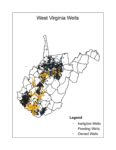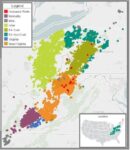Whether the Surface Owner Has a Right to Have a Hearing And/or an Appeal When the State Issues a Permit to Drill a Well on the Surface Owner’s Land.
WVSORO believes that the State’s decision to issue, condition or deny a permit for an oil or gas driller to construct a well site and access road and drill a well on a surface owner’s land is enough “state action” that the surface owner has a constitutional due process right to ask for and have a hearing before the Department of Environmental Protection’s Office of Oil and Gas. And if that hearing goes against the surface owner, there should similarly be a right to appeal that decision to Circuit Court.
There have been no court decisions on the constitutional right to a hearing.
However, in 2002, in a case named Lovejoy vs. Callaghan, 576 S.E. 2d 246 (W.Va., 2002), the West Virginia Supreme Court of Appeals ruled that surface owners have a right to appeal to Circuit Court the decision of the D.E.P. Office of Oil and Gas whether to grant, condition or deny a permit for the drilling of a gas well on the surface owner’s property.
Since that time a number of surface owners have attempted those appeals. The State and the drillers have asked the Circuit Court judges to dismiss those appeals on the grounds that the Supreme Court was wrong. They say that the Supreme Court was wrong because its decision relied upon a statute in the West Virginia Code that gave a right to appeal to other parties (coal companies) but not to surface owners. Some Circuit Court judges have dismissed appeals based on that argument. WVSORO believes that no matter what the statutes say, surface owners have a constitutional right to a hearing and appeal.
Matthew Hamblet is a surface owner in Doddridge County, West Virginia. EQT Production Company proposed a well pad on his property for a number of Marcellus Shale horizontal gas wells. Due to health problems, he was unable to comment within 15 days on EQT’s applications for permits to drill the first couple of wells on the pad on his property. However, in April 2010, he did file comments on EQT’s application for a permit for yet another well on the pad on his property. Despite his comments the permit was issued without any changes.
Represented by lawyer Cynthia Loomis, Matthew Hamblet filed an appeal of the issuance of the permit to the Circuit Court of Doddridge County. The State and EQT as usual moved to dismiss the appeal on the grounds that the Supreme Court was wrong.
Circuit Court Judge John Henning advised the parties that he was going to follow the Supreme Court’s ruling, but offered to “certify the question” of the right to appeal to the Supreme Court to look at it again. A “certified question” proceeding is a way that a Circuit Court can ask the Supreme Court to rule on a question of law at the beginning of a case, rather than having the parties go through all of the evidentiary etc. hearings in the case, and file an appeal at the end.
The State and EQT did ask the Circuit Judge to certify the question to the Supreme Court. The Supreme Court agreed to hear the certified question.
The West Virginia Surface Owner’s Rights Organization then asked to be able to intervene in the case in the Supreme Court on behalf of surface owners, and that has been granted. The West Virginia Oil and Natural Gas Association and the Independent Oil and Gas association asked for the right to file amicus “friend of the court” briefs in the case, and the Supreme Court granted that.
The issue of whether the surface owner has a right to a hearing before the D.E.P. on the permit application, and not just the right to appeal to Circuit Court, has also been raised in the briefs!
The status of the case is that the parties are filing the briefs and awaiting the Supreme Court setting the case for oral argument.
Below are the documents filed with the Supreme Court.
1. The Order of Certification signed by the Circuit Court Judge.
2. The Supreme Court’s scheduling order.
3. Petitioner/State’s initial brief.
4. Petitioner/EQT’s initial brief.
5. WVSORO’s motion to intervene on behalf of surface owners.
6. EQT’s response to WVSORO’s motion to intervene.
10. Supreme Court order allowing WVSORO to intervene.
11. Supreme Court order allowing amicus briefs, but not oral argument rights, for WVONGA and IOGA.
12. Intervenor/Respondent WVSORO’s initial brief.
13. Petitioner/EQT’s brief in reply to Respondent Hamblet’s initial brief.
14. Petitioner/State’s brief in reply to Respondent Hamblet’s initial brief
16. Petitioner/EQT’s brief in reply to Intervenor/Respondent WVSORO’s initial brief.
17 Petitioner/State’s brief in reply to Intervenor/Respondent WVSORO’s initial brief.
19. Respondent Hamblet’s response to WVONGA and IOGA’s amicus briefs.










